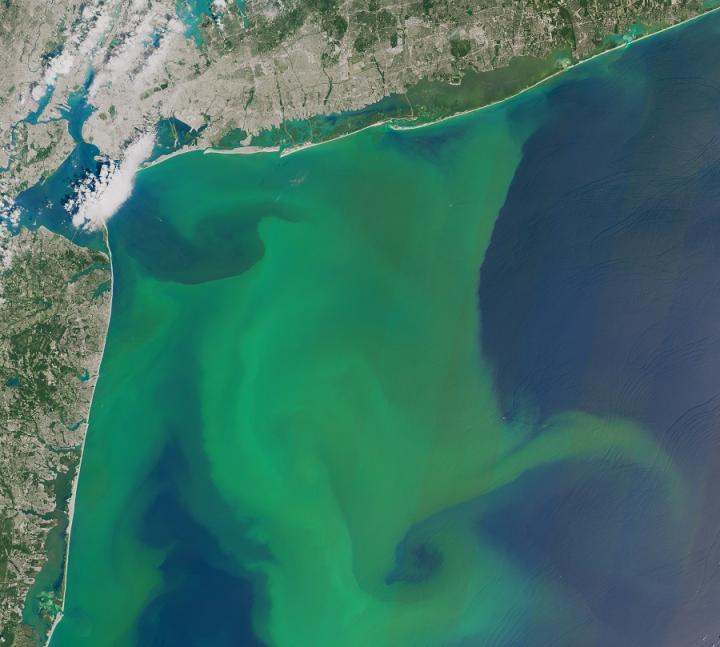Some efforts at reducing carbon emissions could actually increase the risk of water quality impairments, researchers find

Credit: NASA Earth Observatory, by Joshua Stevens
Washington, DC–Strategies for limiting climate change must take into account their potential impact on water quality through nutrient overload, according to a new study from Carnegie’s Eva Sinha and Anna Michalak published by Nature Communications. Some efforts at reducing carbon emissions could actually increase the risk of water quality impairments, they found.
Rainfall and other precipitation wash nutrients from human activities like agriculture into waterways. When waterways get overloaded with nutrients, a dangerous phenomenon called eutrophication can occur, which can sometime lead to toxin-producing algal blooms or low-oxygen dead zones called hypoxia.
For several years, Sinha and Michalak have been studying the effects of nitrogen runoff and the ways that expected changes in rainfall patterns due to climate change could lead to severe water quality impairments.
In this latest work, they analyzed how an array of different societal decisions about land use, development, agriculture, and climate mitigation could affect the already complex equation of projecting future risks to water quality throughout the continental U.S. They then factored in how climate change-related differences in precipitation patterns would additionally contribute to this overall water quality risk.
They found that climate change mitigation efforts that rely heavily on biofuels could have the unintended consequence of increasing the amount of nitrogen entering U.S. waterways, causing water quality problems. Scenarios that required a large expansion of domestic food production would fare even worse, by increasing both fossil fuel emissions and water quality problems.
But win-win solutions are also possible.
“It is entirely possible to fight climate change in ways that don’t have unintended consequences for water quality,” Michalak emphasized. “We need an approach that takes multiple benefits into account in the planning process.”
Perhaps unsurprisingly, the most successful scenarios considered in the study relied on sustainable growth and conservation.
Looking at regional differences within the U.S., Sinha and Michalak found that the impact of excess nitrogen due to both land management decisions and climate-change-related precipitation changes would be the strongest in the Northeast.
Globally, Asia would be at the greatest risk of eutrophication due to projected increases in fertilizer use and anticipated precipitation increases.
“Our findings show that it is crucial to consider the potential for water quality impairments when making societal choices about how land is used and developed, as well as about how we work to fight climate change,” Sinha said. “Access to clean water is essential for human survival, food and energy production, and a healthy ecosystem. Preserving our ability to access clean water must be a top priority.”
###
This work was supported by the U.S. NSF and the U.S. DOE Office of Science.
The Carnegie Institution for Science (carnegiescience.edu) is a private, nonprofit organization headquartered in Washington, D.C., with six research departments throughout the U.S. Since its founding in 1902, the Carnegie Institution has been a pioneering force in basic scientific research. Carnegie scientists are leaders in plant biology, developmental biology, astronomy, materials science, global ecology, and Earth and planetary science.
Media Contact
Anna Michalak
[email protected]
Related Journal Article
http://dx.




